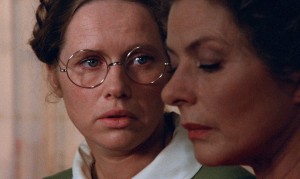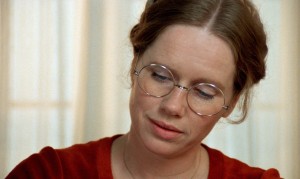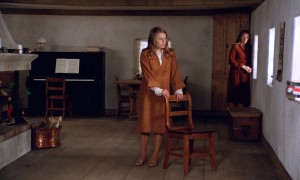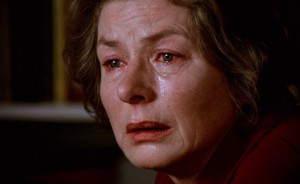
“A mother and a daughter. What a terrible combination of feelings and confusion and destruction.” So says Eva (Liv Ullmann) toward the end of Ingmar Bergman’s Autumn Sonata (1978). More than any other line of dialogue, in what is a remarkably written film, this gets to the crux of the picture’s thematic concerns. Here the mother/daughter composite of parent Charlotte (Ingrid Bergman) and child Eva unleashes an onslaught of conflicting and combative memories, emotions, and personal grudges, all brewing beneath the surface and suddenly liberated during the course of the narrative, in which the harsh realities of a familial relationship in tatters emerge.
Bergman begins the film with a modest depiction of stable domesticity. Eva writes at her desk while her husband Viktor (Halvar Björk), a minister, directly addresses the camera and brings the audience up to speed on his wife’s back-story. Crucially, he twice repeats that Eva has stated, “I feel at home here.” This idea of being comfortable at home and with the simplistic demands that their relatively sedentary life requires is but one point of contrast as Autumn Sonata progresses. Compare this with Charlotte’s comment at the end of the film: “I’m always homesick. But when I get home, I find it’s something else I’m longing for.” In their parsonage, Eva and Viktor are content if not tremendously exciting. The house’s interior suggests a humble situation, as does Ullmann’s unadorned appearance; she has never quite looked so demure and vulnerable. When into this enters Charlotte, very much a worldly and by comparison demanding individual (even her breakfast order is high maintenance), the inevitable conflict begins.

It has been seven years since mother and daughter last saw each other, and their reunion quickly gets off to a rocky start. Charlotte almost immediately relates in detail the recent death of her lover, Leonardo, and, blind to Eva’s obvious joy at having her mother there, rambles incessantly about herself. “Do you think I’ve changed much?” asks Charlotte. “You’re just the same,” replies Eva, who has remained silently off-screen. At first, it seems Charlotte recognizes her self-centered verbal bluster, but she then proceeds to further discuss her graying hair, her new clothes, her back pain, and so on. Then, less than 15 minutes in, the insults start and it’s clear that this visit is not destined to be a pleasant one. To make matters worse, Eva reveals that her handicapped sister, Helena (Lena Nyman), is staying at the house. Not one to revel in difficulties that aren’t of her own creation, Charlotte is displeased by this reminder of her other daughter’s affliction, something she has long since tried to forget. Ranking as one of Bergman’s finest chamber dramas, Autumn Sonata takes this initially hospitable household and steadily develops it into a confining pressure cooker building on the volatile Eva/Charlotte dichotomy.
With Charlotte being a successful concert pianist, music is understandably presented as a key connection between the two women, and as a major point of dissention. Ever in her mother’s musical shadow, Eva feels artistically inadequate. She plays the organ at church; her mother entertains thousands. When Eva tries to impress by playing a Chopin prelude, she asks her mother, “Did you like it?” “I like you,” is the cold, condescending response. Of course, Charlotte then proceeds to play it better. Bergman here includes his now-famous composition of one face seen frontally and one in profile, signifying the private dividing resonance of this implicit altercation.
Following dinner, which with decoratively folded napkins, candles, and flowers, is meant to rouse the sophisticated Charlotte, more friction arises. When Viktor finally speaks substantially (he has so far sat bemused and mostly quiet), he primarily attempts to psychoanalyze his wife to Charlotte. Later, when getting ready for bed, Charlotte and Eva continue their passive-aggressive combativeness. Prone to theatrical dramatics (alone she soliloquizes constantly), Charlotte’s vitality engulfs the pacific Eva. Most of their conversions alternate between accusations and insults and apologies and compliments, a bipolar back-and-forth of discomforting relations.

After what for the film’s first half have been really just previews of pent-up resentment, the severity of such antagonism dramatically comes forth in a prolonged sequence confining Eva and Charlotte to a single room in the middle of the night. Awakened by a nightmare, Charlotte is met by a worried Eva. But it doesn’t take long before this concern shifts to a full-fledged verbal assault. For about five hours, the two undergo a relentless and exhausting exchange of hurtful honesty and brutal revelation. Contending that she never felt smart enough, pretty enough, or talented enough, Eva strikes the first blow against her mother’s parenting skills, or lack thereof. Finished at one point, she demands, “Defend yourself.” Charlotte, in turn, responds with her case for herself and against her daughter, but while we understand where she’s coming from, sympathizing, certainly by comparison, is more difficult.
Threads of maternal concern run throughout Autumn Sonata. Obviously, there are the current issues between Eva and Charlotte, but it’s revealed that more lies dormant, stemming back years prior. With Eva, who was frequently dismissed as a girl by her preoccupied mother, her troubles first came about at the age of 18, when she became pregnant and, if not forced to, was at least not discouraged by Charlotte to get an abortion. A second chance at motherhood was also cut short when Eva’s son drowned at the age of three. Subsequently, with barely any time spent being a mother herself, Eva has retained a strong attachment to her own childhood. This ranges from her aforementioned reticence to her later donning girlish pigtails. However, a sense of her motherly love potential does appear in the compassion shown toward her stricken younger sister. Charlotte too recalls a childhood void of physical attention and consideration, and such similar absence of maternal support leaves Eva to wonder if it isn’t somehow handed down; she even goes so far as to suggest that perhaps there is a hereditary tendency for a mother to feel triumph at the cost of her daughter’s misfortune.
During this volley of personal jabs and accusations, Bergman inserts brief flashbacks illustrating some of the events mentioned in the distressing discussion. Though providing a visual reprieve from the spatial constriction of the room, the cutaways aren’t necessarily required; with two such stunning and gifted actresses as his focus, Bergman could have easily just maintained tight close-ups throughout. Like Persona (1966), Autumn Sonata, itself essentially a two-person drama, boasts an impressive visual intimacy, particularly in this latter sequence. Liv Ullmann and Ingrid Bergman are immensely expressive as their red eyes and weary, tear-stained faces reveal an excruciating catharsis of emotional release (Ullmann calls to mind her painfully emotive performance in Bergman’s Scene from a Marriage five years earlier).

In the aftermath of this nocturnal divulgence of individual torment, Charlotte having now departed, Eva writes her mother a letter. In it, she nevertheless conveys optimism toward their relationship. It’s not clear if Charlotte wholeheartedly concurs, but perhaps some resignation has indeed been achieved. The only question now is of its permanence. Given the abrupt immediacy of their recent purging, it is entirely possible that this hopefulness is temporary and only based on the relative fresh sense of sincerity.
Self-exiled in Norway (due to a convoluted tax evasion charge in Sweden), Ingmar Bergman assembled just a handful of regular collaborators for Autumn Sonata. Ullmann was there, spectacular as always, and Gunnar Björnstrand and Erland Josephson also make appearances. Behind the camera, cinematography by Bergman mainstay Sven Nykvist helps to visually distinguish the film. Starting with the screen behind the opening credits, the picture is color-coded (via lighting as well as set design and clothing) to reflect the titular season and the austerity of the film’s subject matter. Bergman enveloping the imagery in shades of deep oranges and reds and somber greens is reminiscent of his use of dominant reds in Cries and Whispers (1972) and points toward the colorful shift from welcoming warmth to barren danger in Fanny and Alexander (1982).
Finally, the much-heralded casting of Ingrid Bergman is, and was, noteworthy. Magnificently acting in her native language for the first time in more than a decade, this would tragically be the star’s final feature film. A recently diagnosed cancer would take her life just four years later.
Autumn Sonata was released on Blu-ray and DVD by the Criterion Collection.
This REVIEW was previously published in FILM INTERNATIONAL
No comments:
Post a Comment